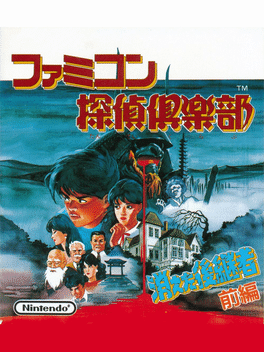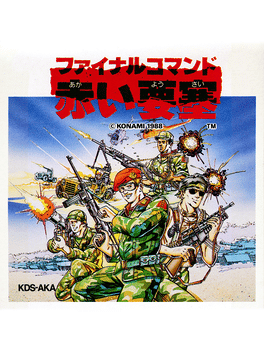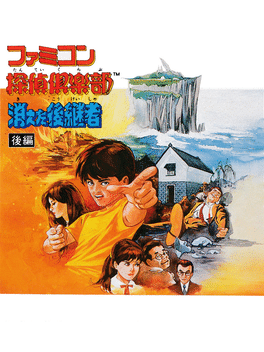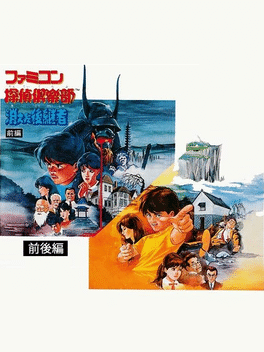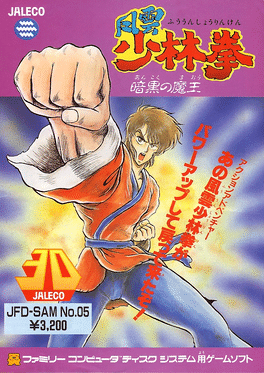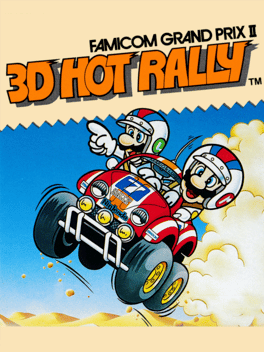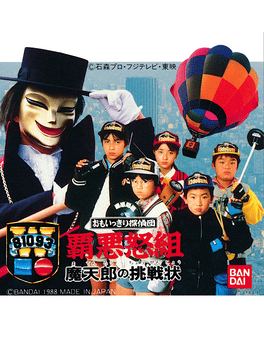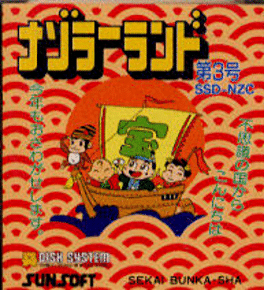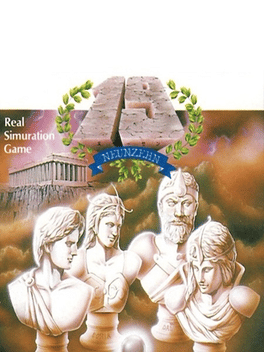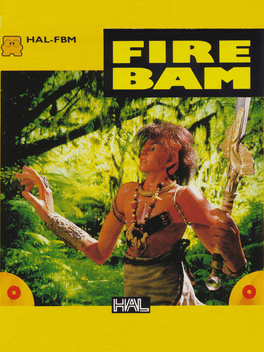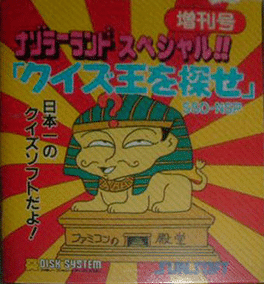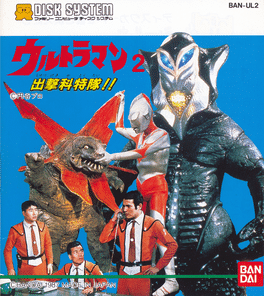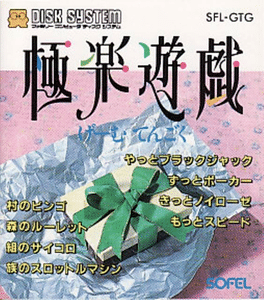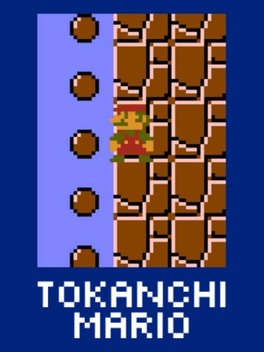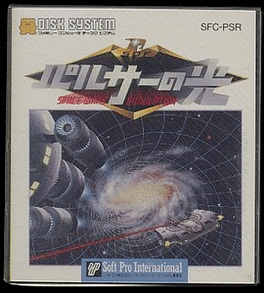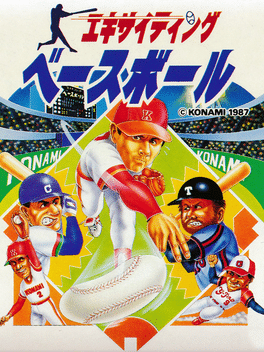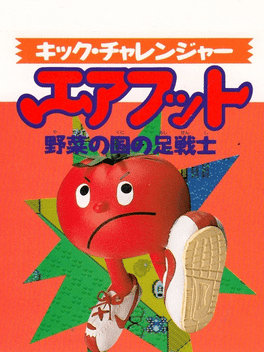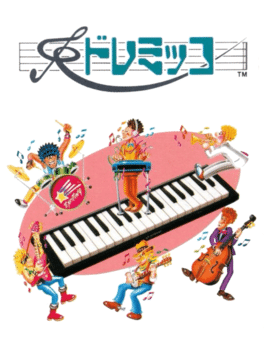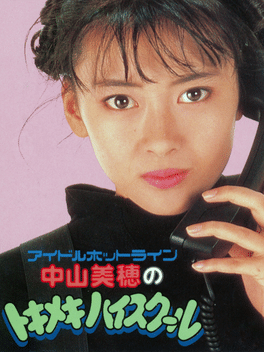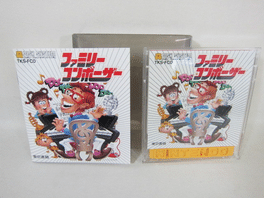New Fds Games - Page 4
-
Famicom Tantei Club: Kieta Koukeisha - Kouhen
1988
Famicom Tantei Club: Kieta Kōkeisha is an adventure game developed and published by Nintendo for the Family Computer Disk System spanning two disks. The game was never released outside Japan. The scenario was written by Toru Osawa and Nagihiro Asama, based on the concept by Yoshio Sakamoto. The story begins with a man named "Amachi" discovering the fallen protagonist on the ground near a cliff. The protagonist discovers that he has lost his memory, and after recuperating, he revisits the cliff and meets a young girl named Ayumi Tachibana. He learns from Ayumi that he is an assistant detective investigating the death of Kiku Ayashiro, and heads over to the nearby Ayashiro estate located in Myoujin village. The Ayashiro family owns a huge plot of land passed down from generation to generation, but there is a strange saying in the village that the dead will return to life to kill anyone who attempts to steal the treasure of the Ayashiro family. As the protagonist investigates the mysterious death of Kiku Ayashiro, h -
Final Commando: Akai Yousai
1988
Your brothers-in-arms are hostages behind enemy lines, and you're their only hope for freedom. But the firepower you'll face to rescue them is awesome. Cannons, tanks, submarines and snipers will blast you with horrific crossfire, while jet fighters zero in from above. To defend yourself, you control the army's advanced all-terrain attack jeep, with its arsenal of guided missiles and incendiary grenades. Of course these are merely tools, and to save your countrymen you'll need more than a handful of gunpowder. -
Famicom Tantei Club: Kieta Koukeisha - Zenpen
1988
This is part 2 of Famicom Tantei Club: Kieta Kōkeisha which is an adventure game developed and published by Nintendo for the Family Computer Disk System spanning two disks. The game was never released outside Japan. The scenario was written by Toru Osawa and Nagihiro Asama, based on the concept by Yoshio Sakamoto. The story begins with a man named "Amachi" discovering the fallen protagonist on the ground near a cliff. The protagonist discovers that he has lost his memory, and after recuperating, he revisits the cliff and meets a young girl named Ayumi Tachibana. He learns from Ayumi that he is an assistant detective investigating the death of Kiku Ayashiro, and heads over to the nearby Ayashiro estate located in Myoujin village. The Ayashiro family owns a huge plot of land passed down from generation to generation, but there is a strange saying in the village that the dead will return to life to kill anyone who attempts to steal the treasure of the Ayashiro family. As the protagonist investigates the mysterious d -
Famicom Tantei Club: Kieta Koukeisha
1988
Famicom Tantei Club: Kieta Koukeisha is a text adventure game. The protagonist is found on the ground near a cliff by a man named Amachi. The protagonist can't remember anything, and finds that he has amnesia. After some rest, he returns to the cliff and meets a young girl, who informs him that he is an assistant detective investigating the death of someone named Kiku Ayashiro. He heads over to the Ayashiro estate, learning that in the village there is a saying that the dead will com back to anyone who attempts to steal the Ayashiro family's fortune. As he keeps investigating, he learns that there may be a connection between this legend and the serial killings in the village. The game has a horror movie-like atmosphere. Actions are controlled by selecting text commands like interrogate, examine, or move. The Famicom Disk System version comes on two disks released on different dates. All later releases have both parts in one release. -
Fuuun Shaolin Kyo: Ankoku no Maou
1988
A one-on-one fighting game only released in Japan on April 22nd 1988 for the Famicom Disk System. -
Famicom Grand Prix II: 3D Hot Rally
1988
Famicom Grand Prix II: 3D Hot Rally is the sequel to Famicom Grand Prix: F-1 Race, although the two games are very different. In a departure from its predecessor, Famicom Grand Prix II features a behind-the-car view. Rather than consisting of a handful of short tracks, 3D Hot Rally provides three long tracks consisting of a variety of different terrain types giving the feel of an actual rally race. As the name implies, the game allows you to use the Famicom 3D System glasses to give the race a real feeling of depth. -
Omoikkiri Tanteidan Haado-gumi: Matenrou no Chousenjou
1988
A group of five detective kids are on a mission to retrieve various objects stolen by a mysterious thief who wears a golden mask. The group counts the leader Hiroshi, the cute and Aikido expert Yasuko who also happen to be the only girl of the group, Susumu, Satoru and Takeo. The mysterious thief uses many ingenious tricks to escape his pursuers, such as a huge and colorful air-balloon. -
Nazoler Land Dai 3-gou
1988
The third and final core entry in the Nazoler Land series of minigame compilations with a magazine theme. It was developed and published by SunSoft for the Famicom Disk System. Nazoler Land Dai-3-gou is the third game in the Nazoler Land series. Like its predecessors, it was developed and published by Sunsoft for Nintendo's Famicom Disk System in Japan only, and contains various minigames with diverse gameplay. These minigames include: Sugoro Quiz All three Nazoler games had a quiz minigame of some kind, but Sugoro Quiz is the first to emphasize a multiplayer aspect. Two to four human players compete in a board game in which players progress by answering trivia questions. Tomo Bakuso The second minigame starring the schoolgirl Tomo, after Nazoler Land Dai 2 Gou's Blast Tomo. In this game, she is trying to pass through a level of platforms, some of which will block access after being passed through a certain number of times. Tanteidan Boy Nazoler An early example of an "escape the room" adventure game, which wo -
19: Neunzehn
1988
19: Neunzehn
1988
A strategy war game for the Famicom Disk System, released by Soft Pro International. It was never released outside of Japan. The title of 19 is based on the Greek pantheon of Gods, of which there are nineteen. "Neunzehn" is simply the number 19 in German. The player controls one of four heirs with an equal claim to the throne of the Greek hero Achilles. The latter sends the four to procure a magical stone that confers omnipotence to the user, originally left behind by the Greek gods. Through warfare, the player-chosen hero must defeat the armies of their three rivals and claim it for themselves. -
Fire Bam
1988
Fire Bam
1988
Bam is a fifteen years old courageous boy. Like every boy his age, Bam must pass the village's test and bring back an insect's shell from the forest. But as he returns, and to his surprise, most of the village has been destroyed and his parents turned into demons. Armed with his sword, Bam sets forth in search of what happened to the village and his parents. -
Nazoler Land Special!! Quiz-Ou wo Ikuse
1988
A spin-off of Sunsoft's Nazoler Land mini-game collections for the Famicom Disk System, this special version is a trivia game. Like the other Nazoler Land games, it was never released outside of Japan. Nazoler Land Special: Quiz-ou wo Ikuse (or "Search for the Quiz Masters") is a trivia game in which the player must answer trivia questions from eight different opponents across Japan in order to win the game. Because the game was never released outside of Japan, it needs a considerable amount of Japanese knowledge to play, both to understand the questions and to be able to answer them. It is not part of the core Nazoler Land series of games, which are all mini-game compilations. -
Ultraman 2: Shutsugeki Katoku Tai
1988
You are in charge of a Tokyo defense team of military experts who find ways of repelling kaiju. Find a way to hurt the monsters and deploy vehicles such as tanks and jets that are able to shoot them down before they destroy any critical buildings. When danger is near and all seems lost, call for Ultraman! -
Gokuraku Yuugi: Game Tengoku
1988
An assortment of eight party games developed and published by Sofel for the Famicom Disk System. Most are based around gambling. SOFEL's Gokuraku Yuugi: Game Tengoku ("Paradise Play: Game Heaven" - no relation to Rhythm Heaven) is a mini-game collection that provides eight different types of game framed as different stations on a TV. The games are variations on: Bingo Roulette Dice Slots Blackjack Poker Concentration (a.k.a. Memory or Pairs) Speed (a.k.a. Spit) The Bingo and Dice games have no scoring system in-game; rather, they are simulations of a randomization process that players can use with their own physical scoring systems at home (such as bingo cards or Yahtzee/Dice Poker sheets). -
Tonkachi Mario
1987
Tonkachi Mario
1987
Tonkachi Mario is a bootleg kaizo rom hack of Super Mario Bros. made with Tonkachi Editor, an unlicensed code editor for the Famicom. It is currently the earliest known rom hack of Super Mario Bros, alongside being the first hack of the kaizo genre, dating back to 1987. -
Pulsar no Hikari
1987
Pulsar no Hikari
1987
A strategic space simulation game created by Soft Pro International for the Famicom Disk System in 1987. It was never released outside of Japan. -
Exciting Baseball
1987
Exciting Baseball
1987
A baseball simulator, Exciting Baseball follows Exciting Billiards and Exciting Basket (better known as Double Dribble in the West) in Konami's series of sports games for the Famicom Disk System. Like the others in the Exciting series it's a straightforward exemplar of its particular sport. It doesn't have the flair of the original two Exciting games, as it never had an Arcade antecedent. -
Kick Challenger Air Foot Yasai no Kuni no Ashi Senshi
1987
You control the tomato by independently directing his two feet, one foot at a time. He make kick in eight directions with whichever foot is not planted in the ground at the given moment. Power ups are revealed by kicking trees, flowers, mushrooms, and other obstacles that are scattered throughout each stage. They may take the form of shoes which grant him the ability move on certain surfaces, or candy which gives him special abilities. Each stage has a "back side" which is accessed by stepping on holes in the ground reveal under kicked obstacles, and provide more power-ups to find. -
Doremikko
1987
Doremikko
1987
A music game developed by Konami for the Famicom Disk System and published in late 1987. Like a few other music games of its kind, it comes complete with a digital keyboard which connects to the Famicom for the purpose of composing and playing music. The inclusion of a large keyboard with the game makes Doremikko the most expensive Famicom Disk System title at the time of its original sale. The name is a play on the Do Re Mi scale. -
Nakayama Miho no Tokimeki High School
1987
The game begins with your character, whose family has just moved to the area, entering his new school for the first time. After class, you accidentally run into a conservative-looking girl wearing glasses. She introduces herself as Mizuho, but you can't help but notice her striking resemblance to your dream pop idol, Miho Nakayama. You pick up a good-luck charm Mizuho dropped to give back to her, then make a startling revelation - your photographer brother took a picture of Miho carrying the exact same charm! You go to the music room to confront her with this evidence - and this is where the true challenge of the game begins. -
Family Composer
1987
Family Composer
1987
Family Composer was developed by Musical Plan for the Family Computer Disk System and published by Tokyo Shoseki in 1987. It was developed by the same team that created Ikinari Musician for the Famicom earlier in the same year. Like Ikinari Musician, it is not really a game, but rather a music simulator. Unlike Ikinari Musician, Family Composer gives players more control over the music played, and even allows them to compose new songs, and record the compositions to disk.
